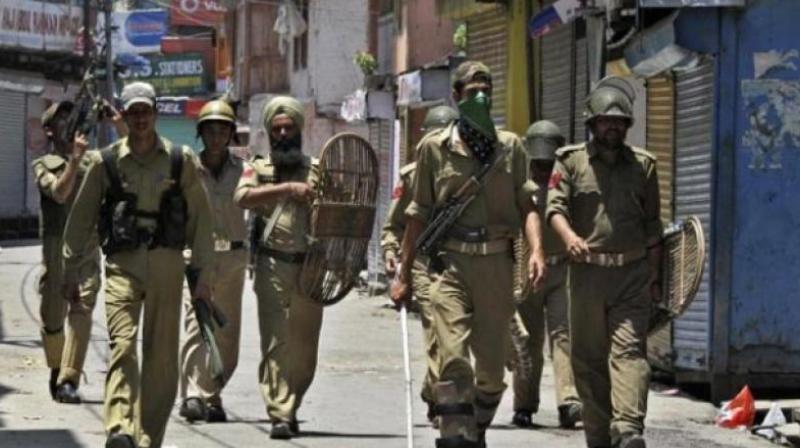Security lockdown in Srinagar after tension mounts post 3 Hizbul militants' killing
Mobile internet services have been snapped and train services are partially suspended “as a precautionary measureâ€.

Srinagar: Reinforcements from Jammu and Kashmir police and central paramilitary forces are enforcing a security lockdown in parts of Srinagar including the old town as tensions rose on Wednesday after the killing of three Hizbul-Mujahideen militants in a fire fight with the troops in central district of Budgam.
Mobile internet services have been snapped and train services are partially suspended “as a precautionary measure”.
Irate crowds have taken to streets in a few areas of Srinagar and Budgam districts whereas large number of people turned up at the funeral of one of the slain militants in Srinagar’s Gooripora locality.
The gunfight between the gunmen and the security forces broke out in Radbugh village of Bunmakhama area of Magam (Budgam) on Tuesday evening and ended with the elimination of all the three holed up militants on Wednesday morning, the officials said.
The trio was hiding in a private house owned by one Mohammad Ramzan Dar at Radbug when the security forces including the Army’s Rashtriya Rifles, the J&K police’s counterinsurgency Special Operations Group (SOG) and the Central Reserve Police Force (CRPF) laid siege to the village following intelligence inputs about the presence of militants, the officials said. A gunfight started between the two sides soon.
“The holed up terrorists opened fire on the security forces as they zeroed in on the house. The fire was returned, triggering the encounter,” said a police spokesman in Srinagar.
An Army official added that the cordon-and-search operation was launched at around 6 pm on Tuesday and ‘contact’ with militants was established at about 8.30 pm. However, the operation was halted for the night to avoid collateral damage. Yet the security forces maintained the cordon of the area using searching lights and other equipment to stop the militants from escaping.
He also said that the militants were gunned down when they tried to break the security dragnet and escape on the Wednesday morning.
“They came out of the house firing indiscriminately in their attempt to break the cordon and escape but the security forces in swift action gunned them down outside the house,” the Army official said.
The slain militants have been identified as Javed Sheikh, a resident of Churpora, Narbal, Dawood from Mustafa Abad, Zainakote and Aaquib Gul from Srinagar. Three weapons were found on the slain militants, the officials said.
The clash comes two days after seven Amarnath pilgrims were killed and 19 others were injured, three of them critically, when the bus they were travelling in was caught in crossfire between militants and the J&K police along the Botengo-Khanabal stretch of the Srinagar-Jammu highway.
The police has blamed the Amarnath attack on Lashkar-e-Taiba but the terror group has denied its involvement and said that the attack on pilgrims was carried out at the behest of Indian intelligence agencies.
The gory incident evoked widespread condemnations in Jammu and Kashmir, rest of the country and by various human rights groups including Amnesty International, the United States and several other countries.
Official sources said that curfew or curfew-like restrictions will not only continue in Srinagar areas but some other parts of the summer capital and rest of the Valley may also be brought under similar curbs from midnight in view of the Kashmir martyrs' day.
The separatists have planned rallies and also called for a state-wide shutdown to mark the occasion.
July 13 is observed as ‘martyrs’ day’ in both parts of divided Jammu and Kashmir as on this day 66 years ago as many as 22 Kashmiris were shot dead by the troops of autocratic Dogra Maharaja outside Srinagar’s central prison where an in-camera trial of a rebel Abdul Qadeer was being held.
The bloody incident heralded an uprising against the Maharaja’s rule and for independence of the Muslim majority state. While July 13 is observed as ‘martyrs’ day’ by both mainstream and separatist political parties and is an official holiday, the latter insist that the struggle for “independence” is still on as India “forcibly occupied part of the State in 1947”.

